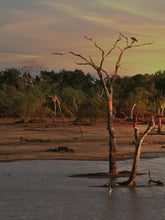

Climate action
Financing climate action
At Save The Duck, we're committed to achieving a zero-emissions economy, aligning with European climate neutrality goals and national ecological transition objectives. Our journey began in 2018 by mapping our greenhouse gas emissions and implementing a rigorousr eduction and monitoring plan.
In 2021, we took a step further by financing climate action, investing in four projects focused on renewable energy production and supporting communities in developing countries.
SBTi and emission reduction goals
At the start of 2022, we strengthened our emission reduction strategy by submitting our targets to the Science-Based Target initiative (SBTi). This international project encourages climate action in the private sector, enabling companies to set science-based reduction goals.
In March 2022, SBTi approved our Scope 1 and Scope 2 emission reduction targets of -50% by 2030, compared to 2018. We also committed to monitoring and reducing our Scope 3 emissions related to our tracked supply chain.
The reduction plan
Every year, we collect the data needed to quantify our emissions, assessing the total CO2 equivalent generated by our activities across the entire value chain.
Since 2022, our GHG inventory has been certified according to the ISO 14064-1 standard. This ensures that a third-party, independent organization verifies the accuracy and transparency of our approach. Discover more >


The projects we support
Musi River Hydro
Owner: South Pole - PT PLN
Renewable Hydropower for the Island of Sumatra
Located in rural Sumatra, this run-of-river hydroelecriticity project harnesses the flow of the Musi River to generate clean energy for the grid. This project supports local jobs and new income streams, and has funded infrastructure improvements, as well as a reforestation program. Discover more >
Bundled Solar Photovoltaic Project By ACME, India
Owner: Multiple Proponents*
Paving the way to a sustainable energy future across India
For many developing countries switching from fossil fuels to renewables to generate electricity creates an additional economic challenge and it is often seen to detract from pressing development agendas. As a result, India’s renewable potential is still largely untapped. Carbon finance provides the finance needed to kick-start clean energy projects, bringing a low-carbon world one step closer. This project reduces reliance on fossil-fuels, cutting the associated emissions and increasing energy security. Discover more >
*Contact us at info@savetheduck.com for further info
Borehole project “Antonio Giaffreda”, Senegal
Owner > Carbonsink - EPS, Energia per lo Sviluppo
Realization of solar powered safe drinking water systems in rural villages
As most of the rural areas of the Western part of Senegal, the community of Mérina Dakhar, is characterized by poor access to drinking water. Many of the used water sources (boreholes, wells etc.) are microbiologically contaminated. Only a small percentage of the rural population in the project intervention area has an easy and direct access to safe drinking water. The project is addressed to improve the hygiene, social, economic, and environmental issues related to the water cycle in rural areas by ensuring the supply of safe drinking water for domestic use as well as for irrigation of agricultural lands. Discover more >
Reforestation Of Degraded Forest Reserve Areas In Ghana, West Africa (Miro Ghana)
Owner > Miro Forestry Developments Limited - South Pole
Implementing sustainable reforestation on the equator
Located in Ghana's Ashanti region, this project repurposes inefficient land with the long-term aim of establishing 12,000 ha of sustainable plantations. Following the internationally recognised FSC certification, the plantations significantly reduces greenhouse gas emissions, provide sustainable timber and increased food
production, and creates employment for the local community. Discover more >


Electricity for stores and suppliers
Since 2022, we've been powering our offices and flagship stores with electricity backed by renewable origin certificates.
In the same year, we saw progress among key players in our supply chain, with some starting to generate their own electricity from renewable sources.
Inspired by this regenerative approach, we began purchasing electricity with certificates of origin for the energy consumed by our direct suppliers in activities carried out on our behalf, such as manufacturing garments and fabrics.



